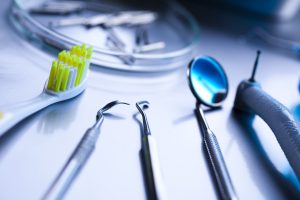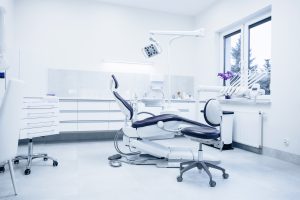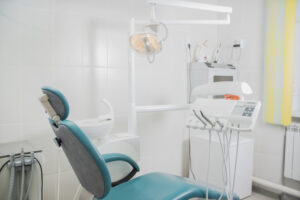
The dental attorneys at Nardone Limited work with dental practices in all aspects of the dental business, including disruptive technology and the impact on dentistry. We have seen technology have some wonderful impacts on the dental field and overall healthcare field. As an example, the healthcare industry, in general, has seen sweeping changes in digitization of health records, virtual patient visits, and high-resolution digital imaging. Dentistry is no exception with notable influences of the digital revolution seen in the form of CAD/CAM assisted crowns/bridges, digitally-assisted treatment planning for implant surgery/restorations, caries diagnosis tools such as digital radiography, digital imaging of fiber-optic trans-illumination, optical coherence tomography, laser fluorescence, and the upcoming impact of artificial intelligence. These advances have not only improved the quality of dental care but also increased the efficiency and predictability of procedures. Teledentistry is one of those areas that many commentators suggest will absolutely disrupt the dental industry by making it more available and overall more efficient and cost-effective.
Background on Teledentistry in Ohio
Recently, Ohio has taken steps to catch-up to technology by passing Senate Bill 259. Senate Bill 259 was signed by then Governor John Kasich in December 2018 (the “Dental Act”) and authorizes licensed dentists in the state of Ohio to perform dental services through teledentistry. The Dental Act authorizes teledentistry—defined as the delivery of dental services by a dentist, or by a dental hygienist or EFDA pursuant to a dentist’s authorization, through the use of synchronous, real-time communication. Synchronous, real-time communication is a live, two-way interaction between a patient and dentist conducted through audiovisual technology. The Dental Act’s teledentistry provisions will become effective September 20, 2019.
What Can an Ohio Licensed Dentist Do under
This Senate Bill 259, The Dental Act?
A dentist who holds a current, valid teledentistry permit is an “authorizing dentist” under the Dental Act and may do either of the following without examining a patient in person:
- Authorize a dental hygienist or EFDA to perform certain services at a location where a dentist is not physically present.
- Prescribe a drug that is not a controlled substance for a patient who is at a location where a dentist is not physically present.
But, before teledentistry services may be provided, the following are required: (i) the authorizing dentist must prepare a written authorization that includes the authorizing dentist’s name and permit number, the name of the dental hygienist or EFDA performing services, the patient’s name, the location where services are to be provided, the authorization’s date, a statement signed by the dental hygienist or EFDA agreeing to comply with written protocols and orders established by the authorizing dentist, and any other information the dentist considers appropriate; (ii) the patient must be informed of certain information regarding teledentistry, the patient must consent to the provision of services through teledentistry, and the consent must be documented in the patient’s record; (iii) the authorizing dentist must establish the patient’s identity and physical location through synchronous, real-time communication; (iv) the authorizing dentist must provide dental services through teledentistry only as are appropriate for the patient and in accordance with appropriate standards of care; (v) the authorizing dentist must establish a diagnosis and treatment plan and document it in the patient’s record; (vi) the authorizing dentist must specify the services the dental hygienist or EFDA is authorized to provide; and (vii) the dental hygienist or EFDA must be employed by or under contract with the authorizing dentist, the authorizing dentist’s employer, or certain business entities associated with the authorizing dentist.
Nardone Limited Comment: It is important to note that an authorizing dentist cannot have more than a total of three dental hygienists or EFDAs working under the dentist’s authorization at any one time.
The Dental Act specifies that an authorizing dentist retains responsibility for ensuring the safety and quality of services provided to patients through teledentistry. Thus, the services must be consistent with in-person services, and those involved with providing services through teledentistry must abide by laws addressing the privacy and security of patient information.
Nardone Limited Comment: The rules summarized above are somewhat vague and the implication and implementation of these rules will need to be addressed by the Ohio State Dental Board (“Dental Board”). Prior to the Dental Board providing rules specifically related to the implementation of teledentistry in Ohio, dentists should tread carefully and ensure they are obtaining the necessary guidance and direction from both a clinical, legal, and overall business perspective. According to a recent update from the Dental Board, the Dental Board has completed its draft of specific teledentistry rules, and this draft will likely be discussed at the next Dental Board meeting on July 24, 2019.
Practical Considerations
An important aspect of the implementation related to teledentistry will include consideration and deployment of telehealth facilitated oral health systems that remain consistent and within the scope of practice within the state of Ohio. This is particularly an issue when considering performing procedures in locations where a dentist is not present. As stated in the American Dental Association policy on teledentistry, “the extent of the supervision of allied dental personnel should confirm to the applicable dental practice act in the state where the patient receives services and where the dentist is licensed. Continued and additional guidance will be necessary from the Dental Board that will define and provide direction on facilitating teledentistry in the state of Ohio.
We also are certain that some dentists will likely be concerned about liability coverage policies providing coverage when they use teledental technologies. Certainly, it is important to make sure that each particular dentist carefully reviews their professional liability coverage and that particular dentist discusses the coverage with both their insurance company and their dental attorney. But, we would expect that as long as the provider was performing services that they were allowed to perform under their license, their coverage would be in effect whether they were using telehealth technologies or not.
Another question that will arise deals with the compliance with the Health Insurance Portability and Accountability Act (HIPAA) when using teledentistry technologies to provide dental care services. The same consideration should apply about patient privacy and data security that apply in a single office environment. Patient’s personal health information must not be disclosed without permission and data security must be insured. Fortunately, there are multiple software and data systems that are adequate to meet these requirements.
In sum, with change comes questions, discomfort, and hesitation. But, this change, as with many other changes, seems to be a positive. Thus, we simply have to tread lightly and move forward with caution until we receive better guidance from the Dental Board regarding implementation of teledentistry. We certainly understand and recognize that the Dental Board sees this as a high priority and will be working with its constituents to ensure that teledentistry is implemented with the utmost recognition for standard of care and public safety. Further, however, dentists and dental practices in Ohio should be looking at this and better understanding how this will help improve their overall business and ability to perform dentistry, while at the same time increase profitability and improve patient care.
Contact Nardone Limited
The dental attorneys at Nardone Limited have vast experience representing buying and selling doctors in dental practice sales and can properly advise you regarding the allocation of the purchase price under an asset purchase agreement. If you need guidance regarding your dental practice sale, contact Nardone Limited.
 Vince Nardone Discusses Employment Contracts with Ohio State Dental Students
Vince Nardone Discusses Employment Contracts with Ohio State Dental Students  Navigating the 2024 Landscape: Strategies and Considerations for Dental Support Organizations (DSOs)
Navigating the 2024 Landscape: Strategies and Considerations for Dental Support Organizations (DSOs)  Sellers of Dental Practices to DSOs need to have a Buyer’s Mentality Requiring Selectivity and a Well-Thought-Out, Decision-Making Process
Sellers of Dental Practices to DSOs need to have a Buyer’s Mentality Requiring Selectivity and a Well-Thought-Out, Decision-Making Process  Increasing Profitability by Minimizing Disruptions within Your Dental Practice
Increasing Profitability by Minimizing Disruptions within Your Dental Practice  As a Dentist, What Are My Obligations Related to Out-of-State Patients and Potential Prescription Drug Abuse?
As a Dentist, What Are My Obligations Related to Out-of-State Patients and Potential Prescription Drug Abuse?